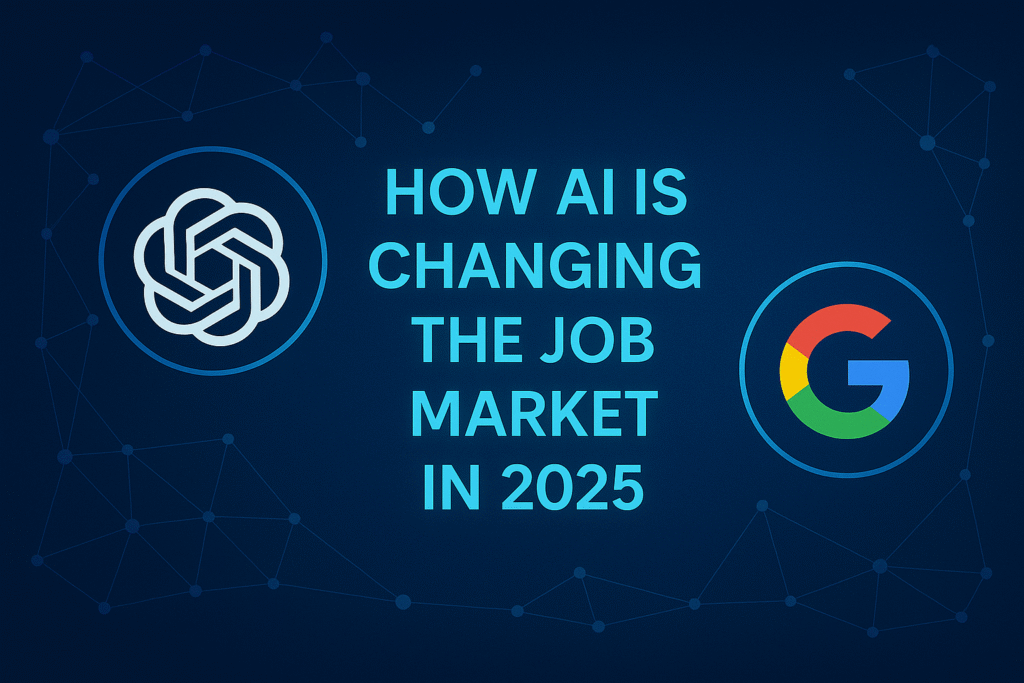AI isn’t taking all the jobs—it’s changing them. As of 2025, artificial intelligence is transforming how we work across every sector, from retail and transportation to healthcare and finance. AI assistants and automation tools are replacing repetitive tasks, while also creating new career paths in prompt engineering, data science, and AI ethics. This article dives deep into the evolving job landscape, provides real-world examples, and offers guidance on how to stay ahead in this shifting environment.
1. Roles That Are Disappearing
Automation is replacing repetitive, rule-based jobs. According to a 2025 report by McKinsey, roles like basic data entry, transcription, and customer service have seen a 30% decline in demand since 2020. AI-powered chatbots now manage customer queries 24/7, and transcription software can transcribe audio faster than any human.
Example: A mid-sized BPO in Bengaluru reduced its support staff by 40% after implementing AI-based ticketing tools like Freshdesk and Tidio. However, this doesn’t mean job loss across the board—it means jobs are shifting.
2. Roles That Are Growing
While some jobs vanish, others emerge. Demand for roles like AI Prompt Engineer, Machine Learning Ops Manager, and AI Trainer has exploded. According to LinkedIn’s 2025 Emerging Jobs Report, ‘Prompt Engineer’ is now among the top 10 fastest-growing roles globally.
Another booming role is that of Creative AI Content Specialist. Small businesses now hire freelancers to create blog posts, product descriptions, and marketing campaigns using tools like ChatGPT and Jasper. Companies also need Data Curators—professionals who prepare training data to improve AI accuracy.
🧠 Example: A startup in Mumbai hired a full-time Prompt Engineer to manage all their AI-generated social media campaigns, reducing content costs by 60%.
3. Upskilling Is Key
To stay relevant, continuous learning is essential. Professionals must adapt by learning how to use AI tools instead of fearing them. Platforms like Coursera, edX, and Google’s AI for Everyone offer free or affordable courses in prompt engineering, data analysis, and workflow automation.
Even basic familiarity with tools like Notion AI, Zapier, Midjourney, and ChatGPT can set you apart. Upskilling doesn’t require coding—many platforms are now no-code or low-code.
🎓 Tip: Spend just 30 minutes a day on LinkedIn Learning or YouTube tutorials to start mastering essential tools.
4. Human Touch Still Matters
Despite rapid automation, AI still can’t replicate emotional intelligence, leadership, or ethics. Roles in management, mental health, education, and creative strategy still require a uniquely human touch.
Example: While an AI can analyze patient data, it can’t deliver bad news with empathy. Schools may use AI tutors, but human teachers are still needed for classroom interaction and mentorship.
💡 Hospitals are using AI to predict emergency risks, but decisions are still made by doctors after AI alerts them—highlighting the AI-human collaboration model.
5. New Hybrid Roles
The rise of AI has given birth to hybrid job titles like ‘AI-Enhanced Marketer’, ‘Automation Strategist’, and ‘Digital Workforce Coordinator’. These jobs blend traditional skills with AI expertise.
A marketing executive today might use AI to segment customers, write ad copy, and schedule posts—all in one tool. Similarly, HR managers now use AI to shortlist resumes and predict attrition, allowing them to focus on strategic initiatives.
🏢 Example: A bank in Singapore trained their branch managers on how to use AI to spot potential loan defaulters, increasing repayment rates by 18%.
6. Remote Work + AI = The New Normal
AI tools have accelerated the remote work trend. Companies are now outsourcing not just to humans but to AI platforms. From automated bookkeeping to AI-generated content, remote freelancers are working alongside bots.
Tools like Slack AI, Zoom AI Summaries, and Asana AI are helping remote teams boost productivity. This shift has also opened global job markets, where a freelancer in Pune can collaborate with a client in Berlin using nothing but AI-powered tools.
🌍 Fact: Fiverr reports a 55% increase in gigs tagged with 'AI tools' since 2023.
Conclusion
AI is transforming—not eliminating—the job market. The roles of tomorrow will be those that embrace technology, not resist it. Whether you’re a student, mid-career professional, or entrepreneur, now is the time to learn AI basics and integrate them into your skillset.
Start by exploring AI tools related to your field, take a few online courses, and practice daily. The future belongs to the adaptable.
✅ Takeaway: Don’t fear the bots. Collaborate with them.






